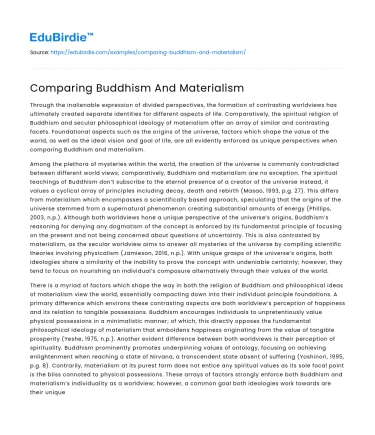Through the inalienable expression of divided perspectives, the formation of contrasting worldviews has ultimately created separate identities for different aspects of life. Comparatively, the spiritual religion of Buddhism and secular philosophical ideology of materialism offer an array of similar and contrasting facets. Foundational aspects such as the origins of the universe, factors which shape the value of the world, as well as the ideal vision and goal of life, are all evidently enforced as unique perspectives when comparing Buddhism and materialism.
Among the plethora of mysteries within the world, the creation of the universe is commonly contradicted between different world views; comparatively, Buddhism and materialism are no exception. The spiritual teachings of Buddhism don’t subscribe to the eternal presence of a creator of the universe instead, it values a cyclical array of principles including decay, death and rebirth (Masao, 1993, p.g. 27). This differs from materialism which encompasses a scientifically based approach, speculating that the origins of the universe stemmed from a supernatural phenomenon creating substantial amounts of energy (Phillips, 2003, n.p.). Although both worldviews hone a unique perspective of the universe’s origins, Buddhism’s reasoning for denying any dogmatism of the concept is enforced by its fundamental principle of focusing on the present and not being concerned about questions of uncertainty. This is also contrasted by materialism, as the secular worldview aims to answer all mysteries of the universe by compiling scientific theories involving physicalism (Jamieson, 2016, n.p.). With unique grasps of the universe’s origins, both ideologies share a similarity of the inability to prove the concept with undeniable certainty; however, they tend to focus on nourishing an individual’s composure alternatively through their values of the world.
Save your time!
We can take care of your essay
- Proper editing and formatting
- Free revision, title page, and bibliography
- Flexible prices and money-back guarantee
There is a myriad of factors which shape the way in both the religion of Buddhism and philosophical ideas of materialism view the world, essentially compacting down into their individual principle foundations. A primary difference which environs these contrasting aspects are both worldview’s perception of happiness and its relation to tangible possessions. Buddhism encourages individuals to unpretentiously value physical possessions in a minimalistic manner; of which, this directly opposes the fundamental philosophical ideology of materialism that emboldens happiness originating from the value of tangible prosperity (Yeshe, 1975, n.p.). Another evident difference between both worldviews is their perception of spirituality. Buddhism prominently promotes underpinning values of ontology, focusing on achieving enlightenment when reaching a state of Nirvana, a transcendent state absent of suffering (Yoshinori, 1995, p.g. 8). Contrarily, materialism at its purest form does not entice any spiritual values as its sole focal point is the bliss connoted to physical possessions. These arrays of factors strongly enforce both Buddhism and materialism’s individuality as a worldview; however, a common goal both ideologies work towards are their unique visions of an ideal world.
A foundational vision of an ideal world is quintessential for all worldviews; comparatively, Buddhism and materialism are immensely contrastive in this regard. Buddhism’s core principles aim to teach all people, despite their social class and wealth, to be content with their current possessions and focus on spiritual success. This differs drastically to materialism which envisions a world where greater physical prosperity equates to further success (Vitzthum, 1996, n.p.). Furthermore, materialism’s ambitious desire to unveil the manifold phenomena of physical nature through scientific advances is heavily contrasted with Buddhism’s primary focus on spirituality. The ultimate objective of life from a materialistic worldview is to possess inexhaustible wealth; whereas followers of Buddhism nourish their spirit to achieve the spiritual goal of Nirvana (Yoshinori, 1995, p.g. 8). This difference is further enforced by materialism’s ideological relation of physical possessions to self-expression and identity; unlike Buddhism which discourages any emotional connection to possessions.
The elementary spiritual values of Buddhism are clearly contrasted with the secular philosophy of materialism which primarily focuses on the importance of physical matter and possessions. Although both worldviews hone a minute amount of similarities, their differentiated perspective of the origins of the universe, the alternating factors of the values of life, and an ideal vision of the world all distinguish their comparative diversity evidently.






 Stuck on your essay?
Stuck on your essay?

